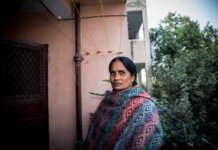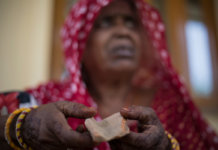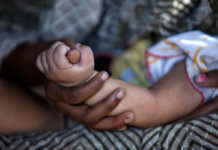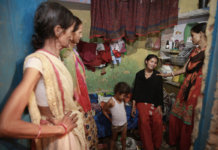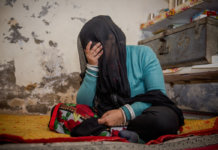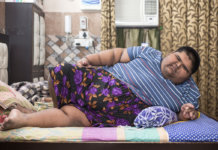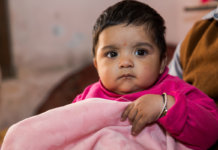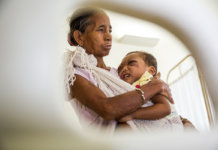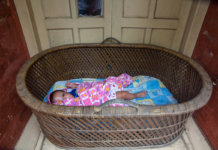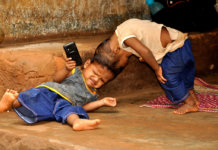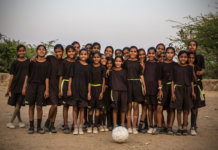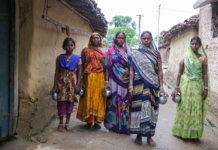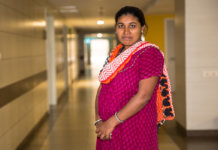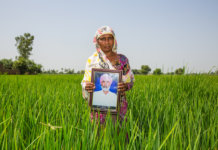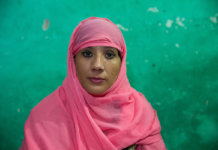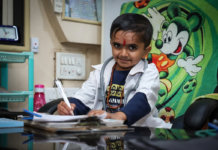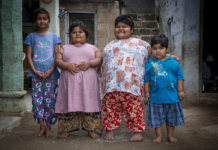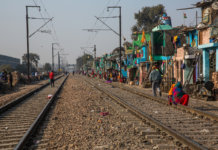Wrapped in her thick woollen shawl, Asha Devi tries to keep warm in the cold New Delhi winter. But for her, the freezing temperatures are just another reminder of the harsh conditions her daughter battled as she lay naked on the road side, after she was gang raped on a bus by six men, on December 16, 2012.
‘We’ll never forget,’ 49-year-old Asha said. ‘But in these months especially, November and December, we have a lot of memories and it hurts a lot. It seems like just yesterday, how she came home tired and then the tragedy happened. We feel suffocated within ourselves.’
On the fifth anniversary on December 16, 2017, Asha is overwhelmed with anger that her killers are still alive and that crimes against women are getting progressively worse in her country.
She added: ‘We hear about these incidents happening everyday in the news. We have the law, police and government but nothing is getting better. Things are only worsening. Small girls are becoming victims now. Will there be a day when we’ll ever feel safe?’
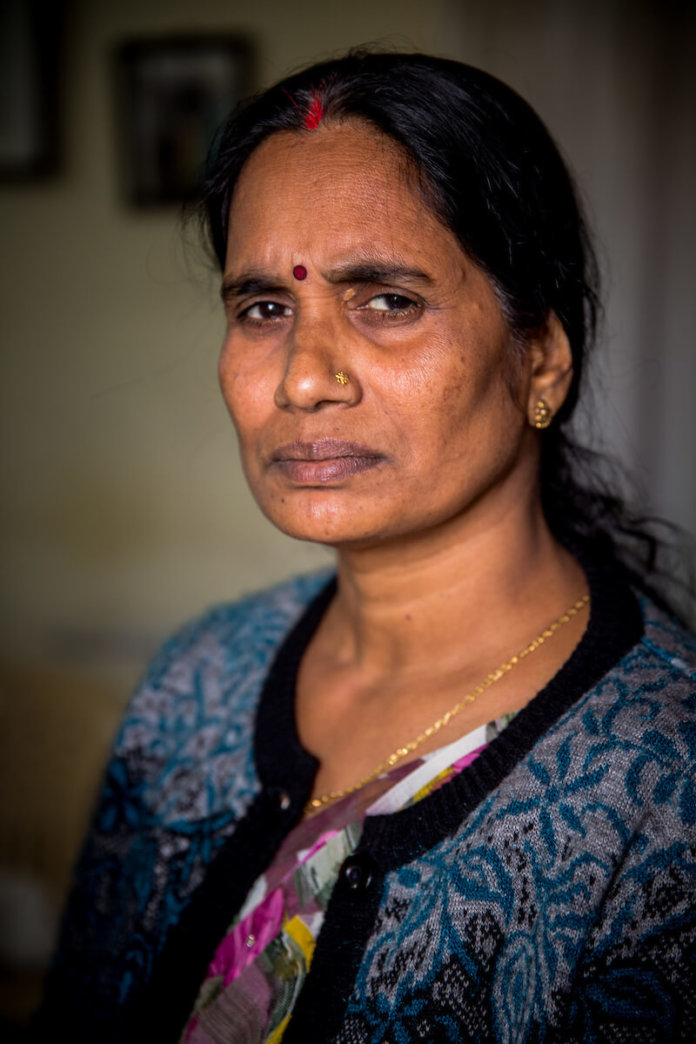
Asha’s only daughter, Jyoti Singh, 23, a student, caught a bus home after watching the film Life of Pi at the cinema with a young male friend. But on that bus there were six men and for the next hour, they took it in turns to rape her and even used an iron bar on her. They beat Awindra until he was unconscious and after they’d finished – assuming both were dead – they threw them both out of the bus, half-naked, onto the road side.
Drivers sped past, some slowed down to look, but no one stopped to help. Eventually, a passer-by did call the Delhi police and they found the two at about 11pm. Jyoti had suffered catastrophic injuries.
‘When did the humanity in all of us die? Nobody even put a cloth on them that night, cars passed, they scrolled down their windows but moved on. They were lying on the road, the extreme pain and torture she suffered continuously fills my mind. How and why did she suffer so much? I die everyday thinking about that night. How did she take all that pain and fight to stay alive? For five years, this has been my main nightmare. I hardly think of my daughter happy but the pain she suffered that night keeps hitting me hard.’
I die everyday thinking about that night
Jyoti and Awindra were taken to Safdarjung Hospital, where Jyoti battled to stay alive to report every element of the crime. Outside, anger grew within the city and reports of the attack brought women out on to the streets and protests escalated. The anger grew and and grew before the entire country was protesting.
On December 26, Jyoti was flown to a transplant specialist hospital in Singapore. Asha and her husband, Badri Singh, now 57, went with her but on December 29 Jyoti could not fight any more, and she died.
‘I keep remembering her, I remember it all, and I don’t want to forget about it either because the day we forget is the day the world will forget. Our innocent child faced so much pain and torture. We feel pain with small injuries, think about the pain she must’ve felt that night? I always think what had she done to deserve this? The pain she went through haunts me. I remember when she gained consciousness in hospital she asked for water but doctors said she couldn’t have a single spoon of water. It hurts me that during her last breath I was not even able to give her a sip of water.’
Since the death of her daughter Asha has found a strength inside of her that she never new existed, and it has driven her to help other vulnerable families in society.
‘I wouldn’t say I was unaware before but now I am very aware of what is happening in our country,’ she says. ‘I have a fight in me now. The pain I feel gives me strength to fight…my wounds gives me the strength to keep fighting for justice.
‘It was not that I did not understand things earlier but now, how can any of us tolerate this? I feel I shouldn’t be silent and I should raise my voice against this. It is claimed that men and women have equal rights but at the same time if a man is roaming freely at mid night it’s no big deal but if a girl is out at 10pm even, she is blamed for any wrong that happens to her. I want this to change. Every individual should have the right to live freely, as per his or her wish.
The pain I feel gives me strength to fight…my wounds gives me the strength to keep fighting for justice
‘I help people because it takes just seconds to die, but people could live if they get a minute from someone. I do small things for people because you never know what it can do. I feel whatever I have lost, I have lost, if I can do something for someone else’s girl, then it’s a real tribute to my daughter. If, by going somewhere or by speaking to someone and by doing something it helps, then there’s no bigger tribute to Jyoti.’
Many people have even encouraged Asha to go into politics but she says she’s not yet ready.
‘There are a lot of people who suggest I should join a political party but I’ve never been in a mood to join politics or become a politician or become famous. I only feel that if I can help any girl child in someway, it brings me some peace. I try to help in whatever way I can.’

Five days after Jyoti’s death, on January 3, 2013, the police arrested six men – Ram Singh, 33, the bus driver, and his brother Mukesh Singh, 26, Vinay Sharma, 20, Akshay Thakur, 28, and Pawan Gupta, 19, and a 17-year-old juvenile.
Their case was pushed through the fast track courts but Ram Sing, often referred to as the leader of the grotesque crime, was found dead in his cell in Tihar Prison, in March 2013, allegedly having committed suicide.
After an eight-month trail all were found guilty, in September, 2013, with four of them sentenced to death by hanging, and the juvenile given three years in a reform facility.
Even though there have been appeals since, the death sentences were upheld by the supreme court on May 5, this year, but have still not been executed.
Asha adds: ‘I want them to be hanged at the earliest but I don’t know how it’ll work. How and when it’ll happen. Time is moving fast but I’m not able to move. My thought process and fight has frozen in one place and the only thing I can focus on is to make sure these convicts get punished.
‘Our case was run in the fast track courts but what has happened? It’s been five years, and they are still alive.’
I want them to be hanged at the earliest but I don’t know how it’ll work. How and when it’ll happen.
Asha continues to protest and fight for justice, but most of her time is spent at her two-bed apartment in Dwarka, given to the family by the government as part of a compensation package. The area is not far from their old home, but much smarter.
‘We shifted to this house thinking it will be a change of environment for our children,’ Asha remembered. ‘There were memories attached to every corner of that house so we thought if we moved, it would be a good change. Now my sister-in-law lives there. We still visit but it’s hard. You may call it her sacrifice but whatever we have received since her death has not meant anything to us. I’d like to thank everyone for whatever we have got and especially their support. Wherever I go there are people who stand with me today and I feel good and fortunate about it. The incident brought me immense pain and I would not have got through it alone but with everyone’s support I have been able to take this fight this far.
‘After the incident I feared my children (sons) may not study further as they were in shock and used to sit quietly in one corner of the house everyday. They stopped talking to everyone. But I feel good for him (oldest son) that he has been able to achieve something in life.’
Asha’s two sons – Gaurav, now 24, and 19-year-old Saurav – have both gone on to study just as Jyoti wanted. And the eldest is now due to receive his commercial pilots licence.
‘He is my child and I feel good to see him happy but they still thank her (Jyoti). They say whatever they have today, is because of her. They took it as their responsibility to fulfil her dream, and studied further. So somewhere in their hearts they feel they’ve fulfilled their sister’s dreams. Both my sons have a strong faith in God but they both consider their sister as their Guru and they feel she is everything. They feel whatever they are today; it is because of their sister.’
But the family barely speak about the loss of Jyoti between themselves nor share their grief with each other.
‘Everyone in the family feels pain but we do not speak about it amongst each other,’ she says. ‘We sometimes talk about her but not a lot. I don’t share my grief with my husband because he gets panicked very easily.’
If Jyoti was alive today she would have been aged 28 and Asha says she would have been married.

‘There’d be such a sense of pride and peace in our house today if she was here. She would most probably be married, a doctor and successful in life. The atmosphere in the house would have been very different.
My kids (sons) are smart and intelligent; they take good care of us; but nobody can take her place.
‘Sometimes we feel we were destined to see this pain. If we do well, we get good, if we do bad, we get bad. They say that whatever happens, is not in our hands, our karma is our prayer. Somewhere I feel it could have been our fault that we have been punished in this way.’
Asha is now quietly determined to keep raising her voice and help change India’s reputation and treatment of women.
‘I feel we, as parents, should never gender discriminate our children. We should consider them equal and give them equal education and values because in a lot of places, we ourselves make our girls weak. Whether in India or abroad, they should be treated with equal rights and values because if we educate a girl and give her good morals and values, it will only benefit several generations to come. All I want is that no daughter should be deprived of her rights and we, as parents, should never encourage such a thing.’

